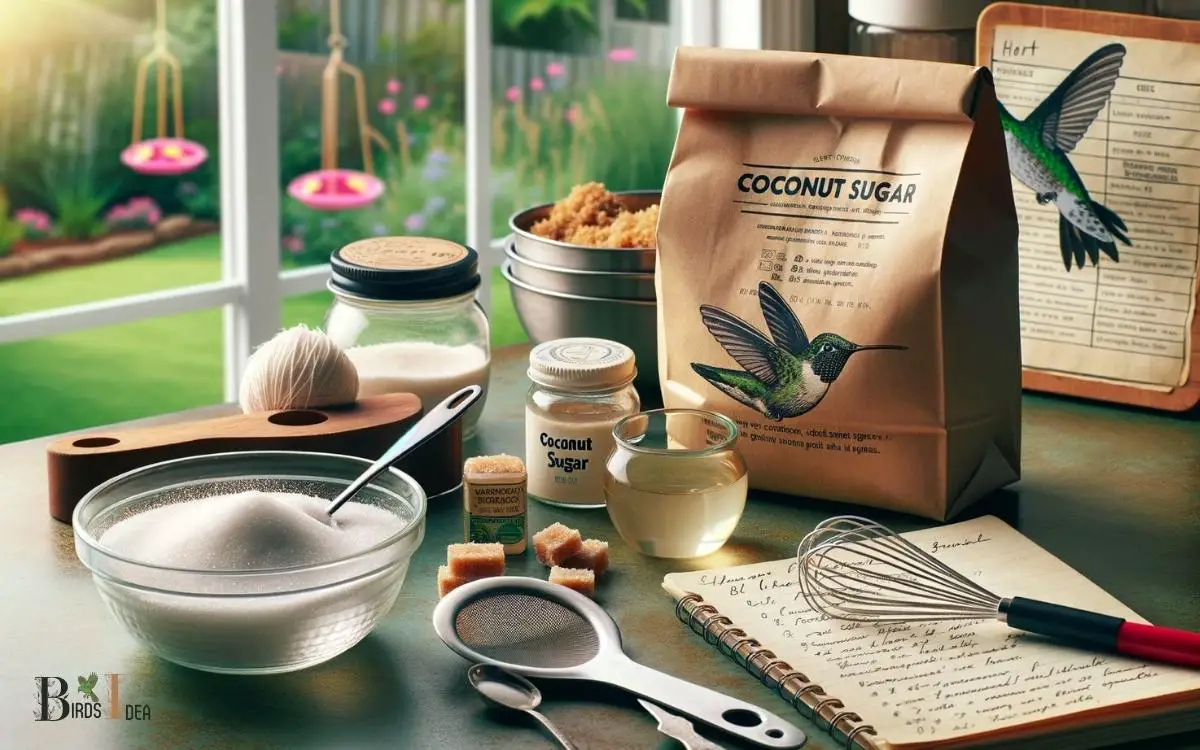Can You Use Coconut Sugar for Hummingbird Food? No!
No, coconut sugar is not recommended for hummingbird food. The best and most suitable food for hummingbirds is a simple syrup made from white granulated sugar and water in a ratio of 1:4.
Hummingbirds require a specific diet, which primarily consists of nectar that closely mimics the sucrose content found in natural flower nectar.
Coconut sugar contains higher levels of fructose and other compounds that can be harmful to hummingbirds.
It is also important to note that:
- Coconut sugar can ferment more quickly, which can lead to the growth of harmful bacteria.
- It contains impurities and minerals that are not suited for a hummingbird’s metabolism.
- The sugar composition does not match that of natural nectar, which is predominantly sucrose.
A simple homemade nectar solution can be created by following these steps: 1. Boil 4 parts water to ensure any impurities are killed. 2. Dissolve 1 part white granulated sugar in the boiled water. 3. Allow the mixture to cool before filling the feeders.
To ensure the health of hummingbirds, always use plain white sugar for their nectar and avoid any additives or alternative sugars.

Key Takeaway
Understanding Hummingbird Dietary Needs
Hummingbirds require a diet consisting primarily of nectar, supplemented by small insects for protein.
Nectar is their main source of energy, providing the high levels of sugar they need for their active lifestyles. It’s essential to mimic this natural diet when providing food for hummingbirds.
When considering using coconut sugar for hummingbird food, it’s important to note that while it contains some nutrients, it lacks the essential amino acids found in the insects that hummingbirds also consume.
Therefore, it’s best to stick to traditional hummingbird food made from a simple syrup of white sugar and water, as this closely resembles the sucrose content of natural nectar.
This ensures that the dietary needs of these delightful creatures are adequately met, promoting their health and well-being.
Exploring the Nutritional Profile of Coconut Sugar
Coconut sugar, derived from the sap of coconut palm blossoms, contains various nutrients such as iron, zinc, potassium, and antioxidants, making it an attractive alternative to refined sugar.
Furthermore, compared to regular table sugar, coconut sugar has a lower glycemic index, which may be beneficial for individuals looking to manage their blood sugar levels.
Understanding the nutritional profile of coconut sugar is essential in determining its suitability for hummingbird food.
Coconut Sugar Nutrients
Exploring the nutritional profile of coconut sugar reveals its composition of various vitamins, minerals, and antioxidants.
- Vitamins: Coconut sugar contains small amounts of vitamin C, which acts as an antioxidant and supports the immune system.
- Minerals: It is a natural source of potassium, magnesium, zinc, and iron. These minerals are essential for maintaining proper bodily functions and supporting overall health.
- Antioxidants: Coconut sugar contains phytonutrients, such as flavonoids and anthocyanidins, which have antioxidant properties that help protect the body from oxidative stress and inflammation.
- Fiber: It also provides a small amount of dietary fiber, which is beneficial for digestive health and can help regulate blood sugar levels.
Understanding the nutrient composition of coconut sugar can help individuals make informed decisions about incorporating it into their diets for the purpose of serving others.
Glycemic Index Comparison
The glycemic index of coconut sugar can be compared to other sweeteners to assess its impact on blood sugar levels.
Coconut sugar has a glycemic index of 54, which is lower than that of table sugar (sucrose) at around 60-65.
This means that coconut sugar causes a slower and smaller increase in blood sugar levels compared to regular sugar.
However, it’s important to note that coconut sugar is still a form of sugar and should be consumed in moderation, especially for individuals monitoring their blood sugar levels.
When compared to high-fructose corn syrup or agave nectar, coconut sugar also offers a lower glycemic index.
However, it’s essential to consider the overall nutritional profile and the impact on blood sugar levels when choosing a sweetener for hummingbird food or human consumption.
Potential Benefits and Drawbacks of Coconut Sugar
Using coconut sugar as a substitute for traditional white sugar in hummingbird food offers both potential benefits and drawbacks.
Potential Benefits:
- Lower Glycemic Index: Coconut sugar has a lower glycemic index compared to white sugar, which may be beneficial for hummingbirds.
- Nutritional Content: It contains small amounts of nutrients like iron, zinc, calcium, and potassium, providing some nutritional value for the birds.
Drawbacks:
- Cost: Coconut sugar is generally more expensive than white sugar, potentially increasing the cost of making hummingbird food.
- Availability: It may be less readily available compared to traditional white sugar, requiring additional effort to source.
Considering these factors, it’s important to weigh the potential benefits and drawbacks when deciding whether to use coconut sugar in hummingbird food.
Moving forward, it’s also essential to consider safety considerations for using coconut sugar.
Using Coconut Sugar in Hummingbird Food
Using Coconut Sugar Alternatives Of Hummingbird White Sugar
Consider incorporating coconut sugar as a hummingbird food alternative with caution and awareness of potential safety considerations.
While coconut sugar can be a natural and less refined option compared to traditional white sugar, it’s important to keep in mind the following safety considerations when using it as a hummingbird food alternative:
- Nutritional Content: Coconut sugar contains certain nutrients that may be beneficial for hummingbirds, but it should still be offered in moderation as part of a balanced diet.
- Potential Impurities: Ensure that the coconut sugar is free from any additives or impurities that could be harmful to hummingbirds.
- Dissolvability: Confirm that the coconut sugar dissolves easily in water to avoid any issues with hummingbirds consuming undissolved particles.
- Monitoring Hummingbird Behavior: Keep a close eye on the hummingbirds and monitor their behavior and consumption patterns when introducing coconut sugar to ensure it is well-received and does not cause any adverse effects.
Impact on Hummingbirds
The safety considerations for using coconut sugar as a hummingbird food alternative encompass assessing its impact on the hummingbirds’ dietary balance and well-being.
When considering the use of coconut sugar for hummingbird food, it’s crucial to evaluate its potential impact on the health and behavior of these delicate birds.
Here’s a comparison table to help you understand the potential impact of coconut sugar as a hummingbird food alternative:
| Aspect | Impact of Coconut Sugar |
|---|---|
| Nutritional Content | Lower than natural nectar |
| Glycemic Index | Lower than regular sugar |
| Potential Health Risks | None reported |
This comparison highlights that while coconut sugar has a lower nutritional content compared to natural nectar, it poses no reported health risks to hummingbirds.
However, it’s essential to consult with avian experts before making any changes to hummingbird diets.
Best Practices for Making Hummingbird Nectar Using Coconut Sugar
- Ratio: Mix 4 parts water to 1 part coconut sugar.
- Boiling: Boil water to dissolve sugar completely.
- Cooling: Allow nectar to cool before filling feeders.
- Storage: Refrigerate any unused nectar for up to a week.
- Cleanliness: Keep feeders clean to prevent mold growth.
- Avoid Additives: Use pure coconut sugar without additives.
- Monitor Hummingbirds: Observe their response to ensure acceptance.
- Educate: Share information on coconut sugar benefits with fellow enthusiasts.
These best practices will help provide the necessary nourishment for hummingbirds while also ensuring their health and well-being.
Now, let’s delve into the alternatives to coconut sugar for hummingbird food.
Can Hummingbirds Survive on Coconut Sugar?
Can hummingbirds survive on coconut sugar? When it comes to making hummingbird food, using distilled water for hummingbird food is crucial. While coconut sugar may seem like a natural alternative, it is not recommended for hummingbirds. Stick to a simple mixture of white granulated sugar and distilled water to ensure the well-being of these tiny creatures who rely on proper nutrition to thrive.
Alternatives to Coconut Sugar for Hummingbird Food
When seeking alternatives to coconut sugar for hummingbird food, it is important to assess the suitability of other sweeteners.
Here are some alternatives to coconut sugar that can be used to make hummingbird food:
| Sweetener | Suitability |
|---|---|
| White sugar | Widely available and commonly used for hummingbird food. It dissolves easily in water. |
| Agave nectar | Natural sweetener suitable for hummingbirds. It is high in fructose and dissolves well in water. |
| Honey | Rich in nutrients and attracts hummingbirds. It is important to use raw, organic honey as processed honey may contain additives. |
| Maple syrup | Natural and unprocessed sweetener that can be used in hummingbird food. It should be diluted with water before use. |
These alternatives provide options for creating hummingbird food that can meet their nutritional needs and attract these beautiful birds to your garden.
Conclusion
While coconut sugar may seem like a natural sweetener for hummingbird food, it may not be the best option due to its limited nutritional value and potential health risks.
It is important to prioritize the dietary needs of hummingbirds by using alternatives such as plain white sugar or making homemade nectar with water and sugar.
Ultimately, it is crucial to prioritize the health and well-being of these delicate creatures when preparing their food.






